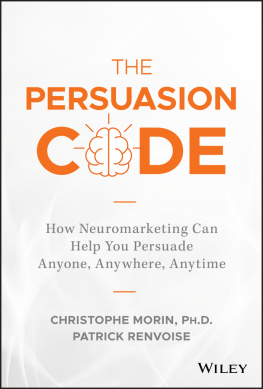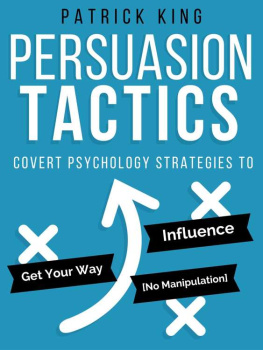A practical guide on a subject that few business courses cover. Enjoyable and informative from an intelligent observer. DR HENRI STAAL, DIRECTOR, KAPELA INVESTMENTS, SOUTH AFRICA
I applied the knowledge immediately it works. MARGREET BORGMAN, FOUNDER OF ORANJEBOVEN GRAPHIC DESIGN, NETHERLANDS
A compelling book with many examples all of us can use. Practical, easy to remember and based on extensive research, here are excellent ideas for when next you are persuading and negotiating. PROF. MANIE SPOELSTRA, INTERNATIONAL NEGOTIATION ACADEMY, SOUTH AFRICA
A fascinating and highly practical book that succeeds in the difficult task of making a complex and potentially confusing subject simple, concrete, accessible, lively and amusing. PHIL GOULD, GOULD TRAINING, UNITED KINGDOM
This book is a must-read for those who believe in the rational mind we are influenced and affected by subtle forces resting in our very human nature. An enjoyable read for the practitioners among us who will not hesitate to question their old ways of interacting. DR ARMIN ECKERMANN, BANKING SENIOR EXECUTIVE VICE PRESIDENT, GERMANY
An easy read where the homework was done. ERIK DU PLESSIS, AUTHOR OFTHE BRANDED MINDAND VISITING PROFESSOR AT COPENHAGEN BUSINESS SCHOOL, DENMARK
The Keys to Persuasion is not your average boring business book. It is an insightful guide on what you need to know about persuasion in order to get what you want in life. Easy to read, extremely well researched, and a book to keep with you at all times. It is the book on selling that I would love to have written. KIM MEREDITH, CEO OF THE DEALMAKER COMPANY, SOUTH AFRICA, AND AUTHOR OFWORK DIVA, DEAL DIVAANDTHE DEVIL IN THE DEAL
This book is dedicated to my lovely wife Lize


Published by Zebra Press
an imprint of Random House Struik (Pty) Ltd
Reg. No. 1966/003153/07
Wembley Square, First Floor, Solan Road, Gardens, Cape Town, 8001
PO Box 1144, Cape Town, 8000, South Africa
www.zebrapress.co.za
First published 2013
Publication Zebra Press 2013
Text Gert J. Scholtz 2013
All rights reserved. No part of this publication may be reproduced, stored in a retrieval system or transmitted, in any form or by any means, electronic, mechanical, photocopying, recording or otherwise, without the prior written permission of the copyright owners.
PUBLISHER : Marlene Fryer
EDITOR: Ronel Richter-Herbert
PROOFREADER: Angela Voges
TEXT DESIGNER: Jacques Kaiser
TYPESETTER: Monique Oberholzer
ISBN 978 1 77022 606 7 (print)
ISBN 978 1 77022 607 4 (ePub)
ISBN 978 1 77022 608 1 (PDF)
Disclaimer
All names of colleagues in the examples and anecdotes have been changed to protect their privacy. None of those referred to still work in the same organisation as the author.
CONTENTS
PREFACE
I have always been intrigued by how our thoughts, minds and decisions are influenced by factors that would, on the face of it, not seem at all relevant. People have an immense and sometimes perplexing ability to form opinions, change their minds and make decisions based on rational reasons, while these reasons may actually only be subjective justifications, or reasons that we make up as we go and that seem plausible to us at the time. Mostly, you and I are simply not aware of how our different moods on a specific day, the elements around us or the framing of information contained in a message can influence our views and decisions.
Our propensity to make decisions based on factors or considerations that we are not even aware of and that we do not consciously think of is especially evident in that which persuades us in a certain direction or causes us to change our minds. The Keys to Persuasion is an exploration of these subconscious elements in our minds that sway, and often impel, us to change our views and opinions and make decisions.
The persuasive influences discussed in this book are by no means exhaustive or comprehensive. The book is intended only as a guide to how to think and act differently, and most probably more effectively, when next you need to convince another of something.
With this book I hope to persuade you to see decisions and decision-making, and the impact you can have on them, through a different lens.
GERT J. SCHOLTZ
JOHANNESBURG
FEBRUARY 2013
INTRODUCTION
You Decide
Think carefully whether any of the following statements apply to you:
- You are completely satisfied with your life and your circumstances.
- Your work and business performance is sound nothing more to be done.
- You have achieved all you have wanted personally and professionally.
If any of these statements are true, you can stop reading this book. In fact, stop right now, as it will not be of any benefit to you.
However, if the above statements do not apply to you, please continue. You are still reading? Good! Another question: In pursuit of your dreams, hopes and achievements, will you have to deal with people at some level or to some extent? Will you have to talk to people? And will they always share the same opinion as you? Of course not.
You will need to talk to people and naturally they will not always share your views or be willing to change their minds. You will need to formulate and deliver your message so as to elicit a change of mind. You will need to persuade them. And by reading this book, you have started on your journey to improve your persuasion skills.
The meaning of the word persuasion is used in a broad and encompassing sense in this book. It is foremost about the psychological triggers and dynamics that cause people to change their minds in ways they wouldnt have, had you not convinced them to do so. The word persuasion encompasses related concepts such as influence and compliance, and even more ominous terms such as mind control and brainwashing. But what does the concept mean in essence?
Perhaps the best description is found when we go back to the historic roots of the word. Persuade is derived from Latin, per, meaning through, in the sense of thoroughly, and suadere, meaning to urge. To persuade is to urge someone thoroughly. Master orators have studied, practised and refined the art of persuasion since the days of the Roman Empire. In ancient Rome, the art of speaking in public was a professional competence cultivated in particular by politicians and lawyers. But the study of public speaking started long before the Roman Empire. Training took place as far back as ancient Egypt, and the first known Greek work on oratory, written 2 000 years ago, set out principles derived from the practices and experience of orators in the Greek city-states. In both Greece and Rome, the main component of oratory was rhetoric the art of using language effectively and persuasively. Since the Greeks and Romans, we have learnt a great deal more about the art and craft of the master persuader. But even today the essence of the concept and activity of persuasion is best captured in its roots: Urge thoroughly!
Persuasion is both an intriguing science and an inspiring art. It is a science because many of the principles underpinning persuasion have been researched, documented and published. It is an art because the application of these principles is intuitive and varies from one situation to another. Persuasion is the amazing skill of changing the attitudes, beliefs and motivating behaviours of others. It is motivating someone to do or believe something they might not have done or believed if you had not persuaded them to it. It aims to win both the heart and mind of another. When you have influenced and changed the attitudes, feelings, decisions, behaviours, actions or beliefs of another, persuasion has occurred.
Next page












